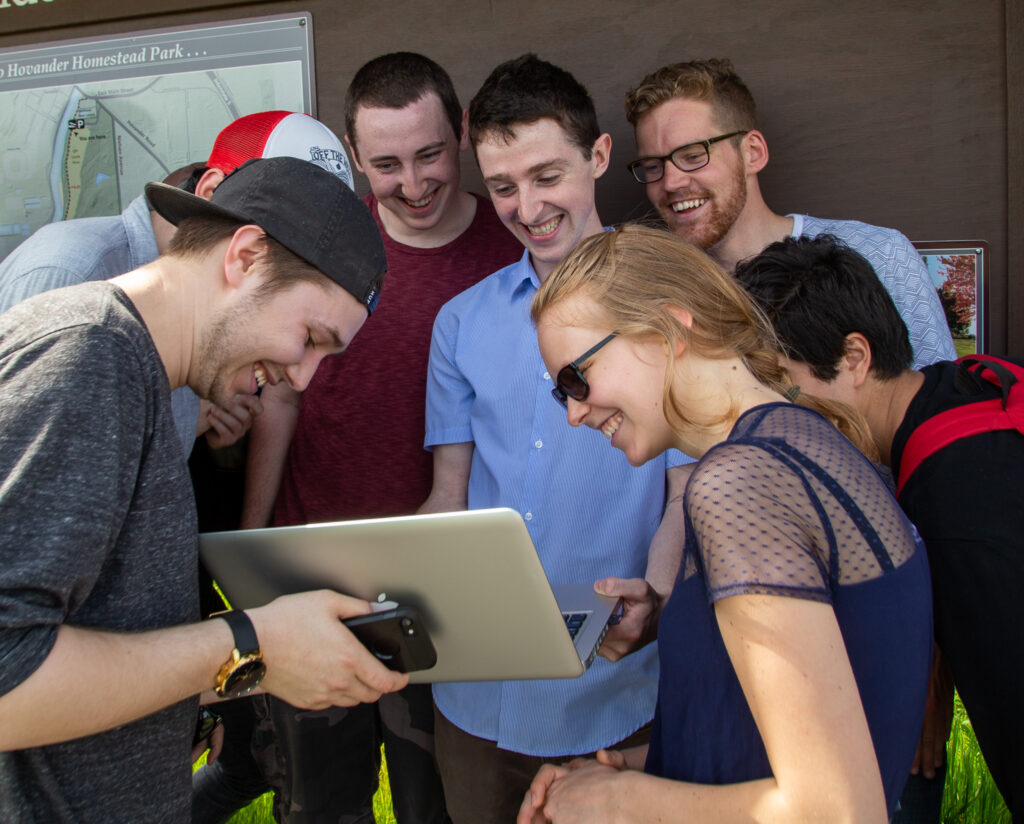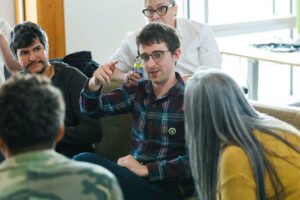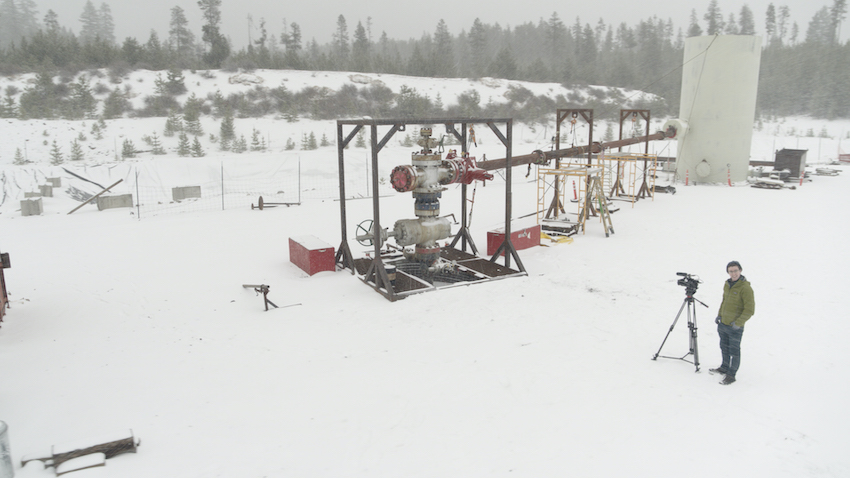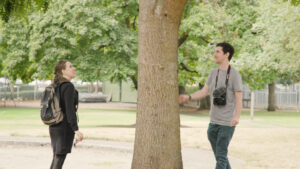Jesse Nichols has more than just luck

Alumni mixes science & storytelling as environmental video producer
By Madisun Tobisch
Jesse Nichols grew up behind the lens of a video camera. He started out with his friends, keeping record of their youthful escapades. In high school, after he got his own camera as a Christmas gift, he began putting together event recap reels for his town’s local venue in exchange for free admission to shows.
He spent his first two years at Western Washington University wondering which path to take. He had a passion for video and the emerging skills to support it, but he needed a sensible entryway to land a career doing what he loved.
Then, whether by luck or coincidence, Nichols saw a job posting for a video producer position at The Planet Magazine.
“So, I signed up, and I caught the journalism bug from there,” Nichols said.
He finished the visual journalism major at Western in summer 2017, after spending about half of his college experience on staff with The Planet. He was an Outstanding Graduate, a status he credits to his academic dedication and the connections he built with faculty members. The baseball-sized globe he received in recognition still sits on his desk.

“I was like, if I’m gonna go into debt to spend a few years pursuing this, I want to take it really seriously,” Nichols said.
He saw every class as a chance to exercise new skills and test his abilities in an environment built for learning and sometimes failing.
“The actual degree, you know, the certificate was really only less than half of what I was paying for,” Nichols said. “What I was paying for was an opportunity to learn and make mistakes, and try new things, and sort of have two years to just really focus on me before I tried to go out into the professional world.”

One of the faculty members Nichols spent the most time with at Western was Warren Cornwall, the former advisor of The Planet. There, Cornwall brought his experiences as an environmental reporter who has been published in The Seattle Times, National Geographic and Science.
“He was one of the best journalists I’ve ever worked with, and I don’t mean like student journalists, I just mean a journalist,” Cornwall said.
Nichols was editor-in-chief of the publication for multiple quarters, leading the student-run staff of writers and editors through the production of issues revolving around themes of politics, human health and people in action.
At first, environmentalism reminded Nichols of his “Boomer, hippie” parents, and he was not certain he would find his future down the same path. It was not until he got started working within the beat, that he discovered the wealth of human stories hiding behind an exterior of scientific data.
Nichols got his next chance at working in the field at Grist, the online, nonprofit publication focused on climate change and justice. In 2016, he spent the summer as a video production intern.
Nichols is not always lucky. Due to prerequisites within the journalism department, the experience did not count toward his graduation requirement. He had not taken the introductory visual journalism class.
“I had to send an embarrassed email to my, now, boss and say, ‘Hey, can I come back for a few weeks to like, do it official?'” Nichols said.
Maybe the second time was all for the best; after the following round as a summer intern with Grist in 2017, Nichols was hired on as a full-time video producer. He said his personal background in video making and his EIC experience on an environmental magazine shaped him into exactly what Grist was looking for.
Nichols was proud to be the last unpaid intern Grist hired. He has seen the publication go through some “soul-searching” moments to arrive at the values and standards it holds today. He said Grist is the best it has ever been since it started in 1999 in terms of both culture and coverage.
“One of the early things that Grist sort of said is like, we’re not just going to do the polar bears and the penguins floating on icebergs; we want people to know that climate change is connected to their everyday life,” he said. “This isn’t a future thing. This isn’t just a problem for sad animals. This is something that you need to be thinking about in probably every aspect of your life.”
Nichols’ work focuses on making climate issues understandable to a general, curious audience. He uses his skills in both video and storytelling to immerse people in the stories he covers. In recent years, Grist has pivoted to featuring more solutions-based journalism, a term Nichols knows has a loaded meaning.
“I feel like it’s rare that I meet a journalist who hears the phrase solutions journalism and doesn’t have a gut reaction of, you know, skepticism,” he said.

Nichols said 2018 brought climate journalism to the forefront of people’s newsfeeds. When Grist started employing solutions journalism strategies to report on climate issues, even Nichols raised an eyebrow. He said he was worried about pushing rooftop gardens and composting on readers while ignoring the bigger picture of the grim but scientific data his reporting relies on.
“It turns out solutions journalism is a totally different thing,” he said.
Nichols prefers the term “responses to problems” over “solutions” even if the name is not as snappy. He finds value in reporting on the things people are trying in order to mitigate the effects of climate change.
“We’re just trying to do the best journalism we can for this unique moment that we’re in,” Nichols said.
As Grist has become more established as a familiar news source, Nichols feels lucky to have been hired on when he was. He said the latest Grist job posting was answered by hundreds of talented journalists vying for a spot on the team.
Cornwall said there is a little bit of luck involved with everything in life, but Nichols made his own place at Grist after putting in the necessary heart and effort.
“He probably would not say that, but they’re lucky to have him — I guarantee it,” said Cornwall. “Nothing wrong with a little luck, but that’s not why he’s there.”
He remembered Nichols as a “story magnet” on The Planet. Now, as they both work in the environmental news sphere, Nichols is still quick to pick up on the human dimension that turns a topic into a story.
“I think fundamentally, he’s wired to be a storyteller — which a lot of people aren’t,” Cornwall said.

Nichols’ current work with Grist includes a “Proof of Concept,“ a video series about the human stories behind scientific discoveries. One of the episodes plays homage to Nichols’ first time as EIC on The Planet where he assigned a story about moss absorbing toxins and allowing scientists to study air quality in hyper-specific areas. When preparing for the project, he checked back in U.S. Forest Service Research Ecologist Sarah Jovan and found a new angle to explore.
Nichols said a second season of the series is in the early stages of development. After spending the last seven years working in environmental journalism, he has come to realize it is one of the richest areas to report on in terms of tracking down stories and delivering them to attentive audiences.
